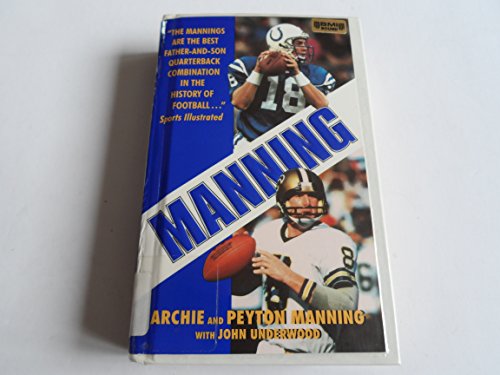In Manning, Archie and Payten Manning, with writer John Underwood, provide a compelling look at football from the perspectives of two generations of players.One, an experienced and battle-scarred father, and the other, a son who has exploded on to the national scene as one of the best young quarterbacks in the history of the NFL.
Together they take a hard look at their careers and all of American football, dissecting the big-money madness, race relations within the NFL (and in sports in general), the rituals of bribery that mark college recruiting, and fans who can no longer identify with the insatiable cash fever in pro sports. They discuss organizational sports and why white youngsters aren't out there playing the game like they used to; the college game as compared to the pros; coaches, good and bad; and why the quarterback position is the most difficult one in all of sports.
It all began in a town called Drew in the heart of the Mississippi Delta -- farm country, where you'd find crops of cotton, soybeans, and rice. As a boy, Archie didn't have much to do outside of school except play sports. Lots of sports. He played them all and he played them well. But football was his passion, and if you lived in Mississippi in the 1960s, there was only one college for you: Ole Miss.
While there, Archie made All-America twice and was so impressive at quarterback, could do so many things to win games, that Bear Bryant, the great Alabama coach, said that he was "the most athletic quarterback I've ever seen." He became, John Grisham wrote, "a legend larger than life." Archie's exploits led him to be selected second in the NFL player draft, where he embarked on a fourteen-year career in the NFL, winning All-Pro and MVP honors. But he labored with the Saints, taking a fearful beating and never winning a championship. The Saints became known as the "Ain'ts."
Meanwhile, he married and had three boys. All three would grow up to be carbon copies of their father: none under 6'4" or 200 pounds. First was Cooper, loose and lightheartened, only wide receiver of the bunch whose football aspirations were cut short by a spinal disorder while a freshman at Ole Miss. Second was Peyton, more serious, studious, and driven, though quite capable of pranks. Third was Eli, who followed in Peyton's footsteps and became an All-State quarterback for three years. Today he is a quarterback at his father's alma mater, Ole Miss.
For Peyton, playing college ball was the fulfillment of a dream and he chose Tennessee. As a teenager he memorized audiotapes of Archie's games at Ole Miss, repeated the play-by-play under his breath as he practiced ("Manning from Drew rolls right...He throws down field to Franks of Biloxi...Touchdown!") and imagined himself performing the same heroics as his father. "I would love to played in the '60s," Peyton says. But he himself did okay in the '90s. Peyton's teams won 39 of 44 games, and he became Tennessee's all-time leading passer, set 33 records, and wound up third in NCAA history in career passing yards and fourth in touchdown passes. He won any number of awards, was named NCAA Player of the Year, and graduated Phi Beta Kappa.
Peyton was selected first in the NFL draft by the Indianapolis Colts, a struggling franchise. He was the only quarterback to take every snap in 1998, but his team had a dismal 3-13 and made the playoffs. Peyton was voted to be the AFC starting quarterback in the Pro Bowl.
Manning is a truly personal and inspiring story of a family, a tradition, and a legacy, providing a stirring -- and at times controversial -- look at football during the past fifty years.
Peyton Manning divides his time between New Orleans, Indianapolis, and East Tennessee.
